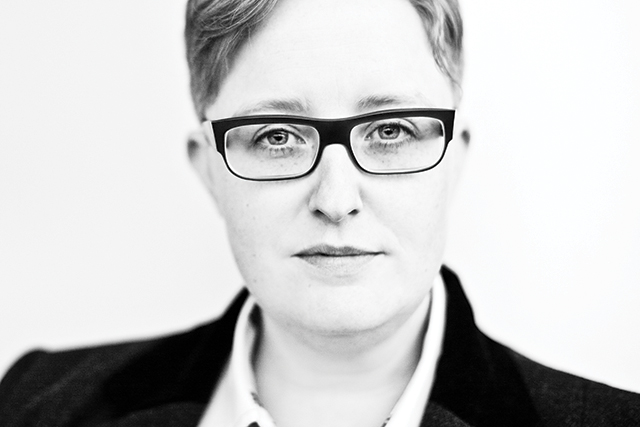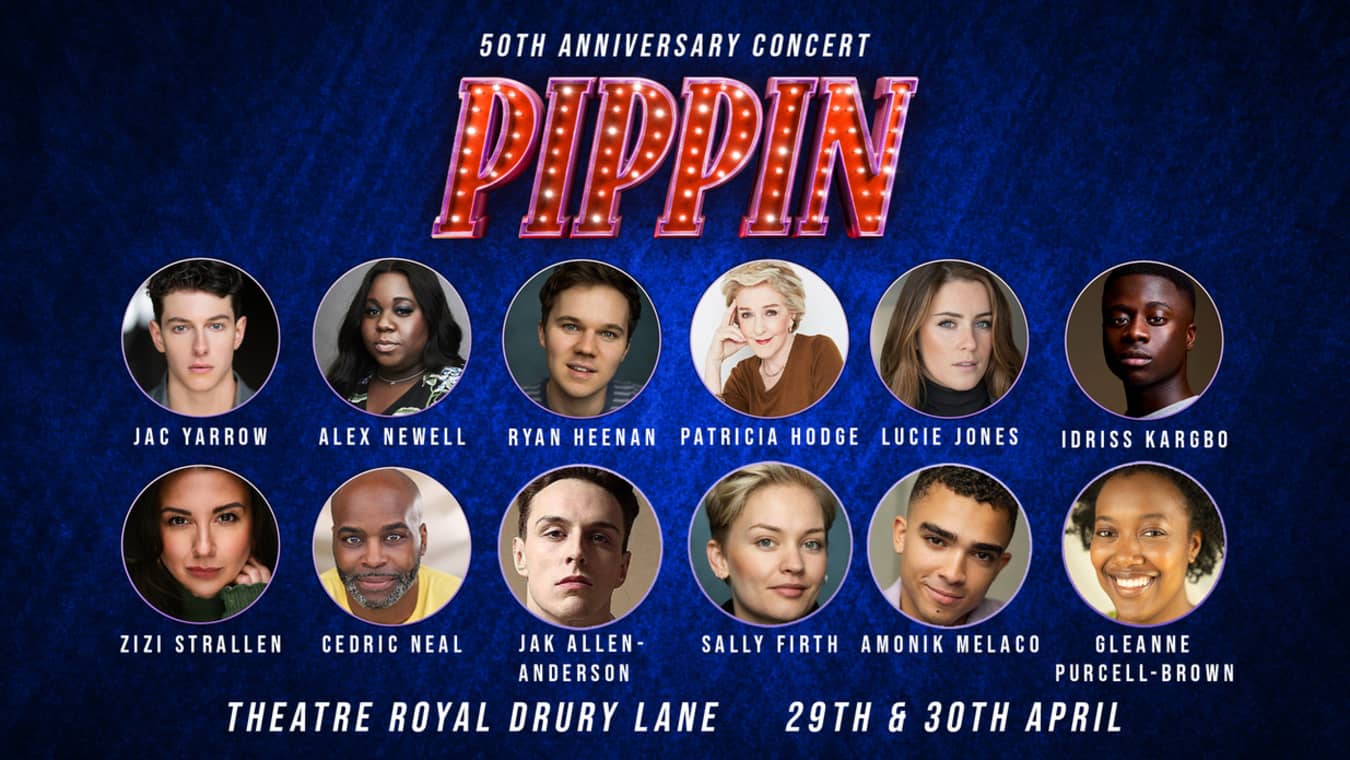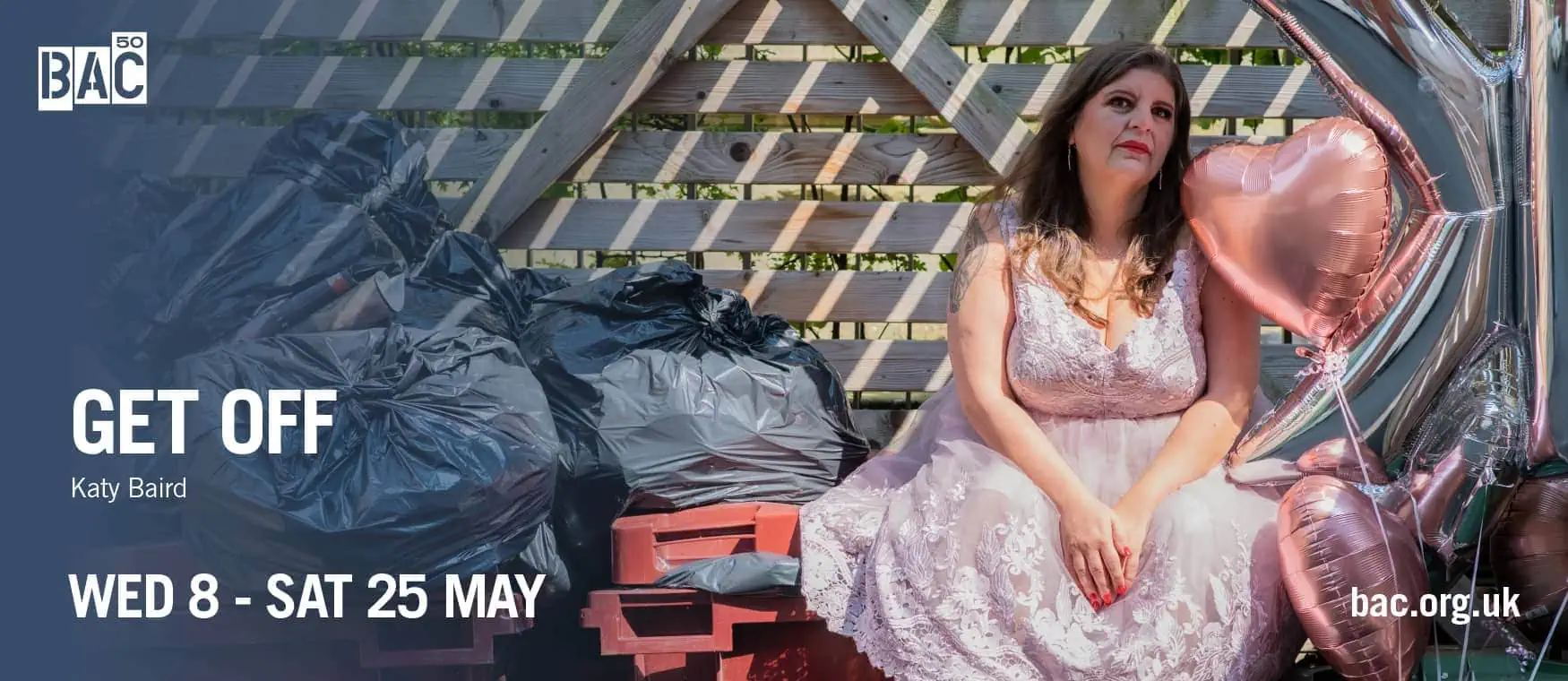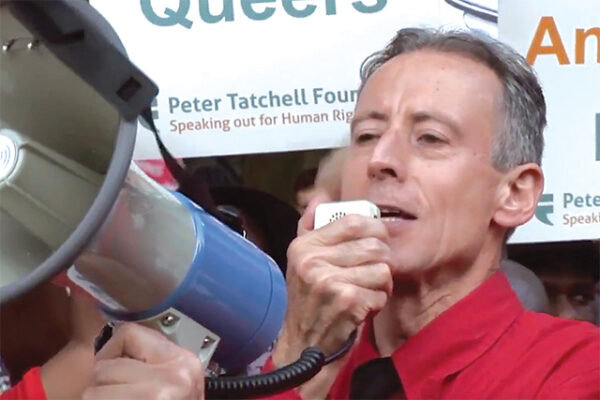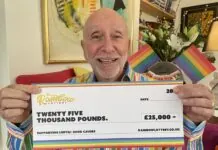Last month several hundred LGBT+ people gathered in the oh-so posh Hilton Park Lane to raise funds for Stonewall. The event raised a whopping £450,000 for the organisation, which prides itself as being the UK’s most foremost gay rights group. We all know its name. We’ve seen its events pop up in the gay press every now and then. But what does it actually do? And why is it so deserving of our charitable pounds?
Cliff Joannou meets new Chief Executive Officer, Ruth Hunt…
Stonewall occupies the lofty heights of a huge office block towering over Waterloo station. The panoramic views from across the office provide a snapshot of London in 2015. Endless construction cranes stick in and out of the city skyline like long needles slowly knitting together the tapestry that is the ‘world’s greatest city’. Just across the river are the towers of Westminster’s political heart. It’s an inspiring view, and utterly relevant given that Stonewall is tasked with monitoring the rights of the nation’s lesbian, bisexual, gay and now trans (more on that later) population. But what do they actually do for us?
Stonewall was set up 25 years ago in response to Section 28, the then Conservative government’s much maligned legislation that saw any mention of LGBT lives banished from the school system. It was a heinous piece of legislation that affected generations of non-heterosexual young people. Its effects are felt to this day in gay bullying, rising HIV rates and even the sinister drug dependency issues we see plaguing our community that frequently finds root cause in the forced invisibility of young LGBT people. Stonewall cheered on the repeal of the law in 2003, but its consequences still ripple through our community today.
“We’re not in the closet any more but we still haven’t found a way to share our stories.”
Gay rights in the UK have taken huge strides since then. But while we may have gay marriage there’s still an immense amount of inequality out there in regards to the wider acceptance of LGBT people in society. Laws may change, but society’s mindset moves at a slower pace. As progress moves forward in the law, often the anti-gay lobbyists dig their heels in further and make life harder for those less able to defend themselves, like young LGBT people and the disabled.
“We host meetings with the community,” Stonewall’s new CEO Ruth Hunt tells me. “We create spaces where disabled, BME [Black Ethnic and Minority], and trans people can meet us so we can hear about their experiences. It’s a big part of what we do, otherwise it becomes about one type of gay person.”
Hunt officially took on the post last August, six months after Ben Summerskill stepped down. She joined Stonewall as Senior Policy Officer in 2005, previously working at the Equality Challenge Unit. Hunt grew up in Wales and Birmingham and at 34 she is noticeably young to take the Chief Executive role of a major organisation.
“The challenge is how do gay people lead the way in creating a more diverse understanding of what it is to have relationships? To dress how you want? To act how you want? Be who you want? That’s our responsibility now.”
Change was needed. The organisation had become staid and introspective. It had dropped the ball on equal marriage, with Summerskill slow to voice support for the cause. Added to that, the ongoing shadow cast across the charity over its exclusion of Trans campaigning loomed darker as that community’s needs became increasingly high profile in the media. A long consultation with “hundreds of trans people” under Hunt’s stewardship resulted in Stonewall officially adding the ‘T’ to ‘LGB’.
Why did it take so long? “My job is amazing. It’s the best job in the world. But we don’t always get it right, I know that. But when we do, it makes a real difference. I’ve been really impressed with the sheer willingness of people to engage with that conversation [on trans issues], how many different experiences exist, but also how much we all have in common.”
Hunt draws on her appearance as an example of how she’s also affected by prejudice. “If I’m out in the street in my jacket and tie with another woman in a jacket and tie, the level of abuse we get is off the scale. If I’m with a girl who’s quite feminine, then that’s a bit more acceptable. That’s nowhere near transphobia by any stretch of the imagination, but to pretend we don’t have shared experiences is not helpful.”
So, why did it take so long to get trans issues on the Stonewall agenda? “When we started out, [transgender law group] Press For Change was our sibling organisation. As we got bigger and influencing in different ways we were dealing with organizations that could barely spell lesbian. We would go in and ask if they had any gay staff, and they would say ‘no’. And then they would come back to us after they spoke to their staff and say, ‘Oh yeah, we have got gay staff and they’re really happy.’ To then say ‘what about trans?’ would have blown their mind. So, it was easier to say, ‘OK, now speak to Press for Change’.
“When we spoke to the Department of Health about lesbians needing smear tests, Press For Change said some trans needed smear tests. They were very different issues to take on board in those days, but as people got better at understanding those differences Stonewall should have said ‘Shall we think about those issues?’ But it needed a fresh start to have those conversations,” she says referencing the change of captain at the top.
She cites Stonewall’s main concerns now as “the massive level of hate crime, bullying in schools, keeping young LGBTs safe when they come out, gay visibility in sport and international LGBT rights.”
Stonewall receives no money from the government. It employs 85 staff that work with 700 employers, schools, nurseries, colleges, researchers and political policy makers to push the discussions of LGBT rights forward. Its events team is tasked with raising the money to do that, including hosting those fancy dinners in five star hotels.
“Suddenly we can get married, that doesn’t mean we all should get married.”
Do the posh dinners work against Stonewall’s image as being grounded in the community? “The posh dinners are big fundraisers. If I said to all those people can you give me £1000, they will say ‘no’. If I said, do you want to come to a dinner and pay for it, they’ll say ‘yes’. We have 650 people coming for dinner, and that is our biggest fundraiser of the year.”
In these times of austerity in which big business is being seen as walking all over the average person, do these events present Stonewall as too elitist? “When Stonewall was set up it was accused of being elitist and not in touch with the community because it was designed to influence MPs, peers, parliamentarians. We’re about influencing. Stonewall is a strategic influencing organisation. There’s some really weird legislation that goes on that we stop. The work we do is of benefit, but you may never see that.
Hunt elaborates further, “Stonewall has deliberately set itself up to be not necessarily of immediate interest to the scene, but doing everything we can to make sure nobody is discriminated against in that scene. The priority has been to get the police to stop arresting gay men. So gay men might think that Stonewall has been elitist and not got anything to do with them, but that’s been the objective.”
Ruth does acknowledge that as times have changed, so must Stonewall. “I think increasingly we want to make those connections more, we want to go back into seeing the beautiful diversity of our communities reflected in our work, and making that important and valid.”
Working so centrally in the Westminster bubble brings its own challenges, such as the snail’s pace with which political change moves. “The thing that Stonewall’s learned is [change] takes a lot of time. A lot of it is just bureaucracy.”
The main issue facing legislation change is the political tennis that happens between parties, each wanting to take the credit for the popular changes in law. “We have to get to the point where people think that they’re getting the credit. There’s all that game playing that goes on that feels a bit like a farce. Ben [Summerskill] was a genius at it, whereas I’m a bit like ‘But you’re all talking rubbish, why don’t you just do it’. It’s a pantomime, it’s a game. But the reality is that every institution is like that. Everything we do at Stonewall is about the negotiating, that nudging. Who gets the credit is really important. I don’t do that enough, I need to do more of it.”
Ruth gives the complex nature of civil partner conversions as an example of the long journey that a campaign or idea takes to legislation. “Part of the role of Stonewall is to enable and amplify those voices and strip out ego.”
As disheartening (unsurprising?) as it sounds, often our politicians are the kind of people that act on good causes only when nudged in the right direction, or will act on it fastest when the glory for doing so shines on them. As such Hunt recognises the fact that real, noticeable equality will only really happen when we all take responsibility for it.
“My absolute dream in this job for the next five years is to get to the stage where whatever you want, you can do, and we’ll help you do it. But you don’t need to belong to us to do it.”
I agree that to create a better world it can’t just be left to the politicians for it to manifest. “We want everybody to have a role to play making their community better,” Hunt states. “We all live somewhere, we all have schools next door. The gay movement for the last ten years has been quite selfish, it’s been about rights for ‘you’, and ‘your’ right to get married.”
She has a point: how many times have we breezed passed a Facebook status condemning Isis for its actions in throwing a gay man blindfold off a building, to which we all-too weirdly click ‘like’. It’s all well and good voicing our disgust online, but what do any of us actually do to make the world better?
Hunt believes it’s as easy as starting with the young gay guy next door. “How do we persuade your mates on the scene to give a damn about the kid who has dropped out of school at fifteen, is not too smart and is trying to find his way in the world of work in his local Tesco and is scared to tell his dad he’s gay. How do we help him, because we have a responsibility to him?”
It’s a bold vision of a better LGBT community that I agree we should all play a part in. “I want those gay guys who go for a drink and say ‘What’s Stonewall got to do with me’ to go back to their schools and say what it means to be growing up and be gay. I want the drag queens to be able to go and talk to people who are not understanding what it is to feel like they want to dress up, and how that’s different to gender identity. I want people to tell their stories. Because we’re not in the closet any more but we still haven’t found a way to share our stories.”
Hunt and I discuss the resurgence of interest in global LGBT rights in recent years, and how social media has played a part in raising awareness of other experiences. People feel they can make a difference now, however small. But is it enough to just re-Tweet outrage at injustice and sign a petition from the comfort of your sofa and the safety of your home?
“Social media has made a difference,” Hunt speaks of this renewed interest in LGBT rights. “Part of Stonewall’s challenge is how do we capture that enthusiasm and give people something to do? It took Britain 25 years to get rid of Section 28. Russia has just introduced it.”
Hunt is realistic about how much international change we can accomplish from the UK as a finger-wagging Western nation. “The big challenge is that people like Putin aren’t going to be shamed. So, what we do is support the activism in those countries. We worked with a group of Russian human rights defenders and trained them on how to set up a campaigning organisation and trained them how to do business planning, budgets. We train them here and in Russia.”
Can I write about this, I ask? She says that I can now, but at the time it was work that was conducted quietly. “We do this discretely. We can’t shout ‘Hey, look what we’re doing, we’ve got twelve people from Russia in our office’. We do this with lots of different countries.”
Stonewall recruits four people who specialise in international rights. “[Other countries] were coming to us and asking ‘how did you get rid of Section 28, how did you get into schools, how did you campaign to get hate crime legislation?’ And we couldn’t answer that under charity law, so we changed our objectives to enable us to answer those questions. We felt we had a moral responsibility to share that learning.”
Hunt makes a distinction between this kind of work and actively supporting other embattled LGBT communities. “That’s different from taking on those campaigns. We mustn’t have an office in Russia, that would be completely wrong. But if we’ve got expertise to share, we should be sharing it. So, when we talk to people in Russia, we tell them what we did 25 years ago with education. We tell them how we talked to other children’s charities, trade unions and women’s groups. We taught them to build coalitions. That’s the right thing to do.”
What have been the biggest challenges since taking over the role? Hunt pauses and reflects. “It took me a while to get used to the level of personal abuse that comes with this job.
As the figurehead of this organisation people direct their anger and frustration at me personally, which came as a surprise to me and is hard. Being called an evil dyke who’s trying to corrupt children. They’re angry with what Stonewall’s doing with schools but it manifests in personal abuse with me. But I had to develop a thick skin very quickly. What surprised me is not how things go wrong, but how people respond to that.”
It’s not just outside forces that Hunt has had to contend with. I wonder what negativity she has faced from within the LGBT community? As much as we like to present ourselves as a united people, we can also be the first to tear each other down. “It’s a massive community and Stonewall doesn’t have universal love. Some people want us to work in a different way, to be more radical, calling on boycotts. But we’re not that kind of organization.
“What’s beautiful about the gay world is you have lots of different types of campaigning. You’ve got your Peter Tatchells, you’ve got your Stonewalls, you’ve got your local groups doing amazing work. We’re really privileged to have that range. You don’t have to choose one or the other. But sometimes people think you can only have one. You need all of us to get results.”
Is it harder doing this job as a woman and as a lesbian? “Not so much any more. I think people don’t expect me to be as good as I am. People’s expectations are lower of women. Being young is more of a barrier,” she says with a wry smile. “People think I’m too young to know what I’m talking about. But I know what I’m talking about.”
Indeed, one of her detractors would be from within Stonewall’s own ranks. When her predecessor, Summerskill, left the job Pink News reported how a barrage of negative Tweets (that highlighted his noted absence) flooded in from him during her first fundraising dinner.
“This is a really intense job that takes up all your time and life. You’re not off at any point. Everybody expects you to live the job. It’s hard to go ‘I’m not going to be gay today’. Ben did that job for eleven years, and breaking up is hard to do. He resigned, and I think he missed it. That dinner had been his and that’s something I was doing. You know, people do all sorts of things.”
Hunt is determined she won’t match his length of service. “I’m not going to do eleven years. But it’s also hard to leave because Stonewall is like a family. You hear other charities talk about ‘them’, as in ‘we’re working to help them’. But we talk about ‘we the LGBT community’.”
I mention how many young people I speak to now are complacent with gay rights in the UK. They think that with gay marriage now law we’ve achieved what all we need to.
Hunt believes there’s plenty more work to be done, and to think otherwise is dangerous. “We’re not secure enough. We’re not solid enough. I think it’s pretty OK to be gay now if you are employed, rich, handsome, home-owning, proposing to have your two kids, had your marriage, had your civil partnership. We talk about good gays – ‘it’s good to be gay if you’re a good gay.’ Most of us are not good gays, we like clubbing, or we like taking drugs or we like doing this or that and we are who we are and that’s not an acceptable face of gay yet.”
She continues, “It’s fine to be gay in Central London, in Soho, but you can’t do that in Lewisham if you’re two women. Our ability to know that in our guts is so damaging that we have to risk assess every situation we go in. It comes so second nature, how can you say we’re equal? Until you get to the stage where you don’t have to risk assess every single situation on a night bus, we’re not there yet.”
What about the rising issue of chemsex affecting so many gay men today? As a new plague of mind and body, in many ways it’s arguably as damaging to our community’s mental health as other crises we’ve faced, from 150 years of criminalisation to AIDS.
“Sadly, this is a growing problem,” Hunt says of the subject. “Our own research into the health of gay and bisexual men found that half of gay and bi men have taken illegal drugs in the last year alone.
“In terms of what Stonewall are doing, we’re pushing for statutory PHSE and SRE in schools to ensure that young people learn about healthy relationships, safe-sex and understand the impact of risk-taking behaviour. We’ll continue to work and support organisations like London Friend and GMFA who are already undertaking pioneering work in this area to support gay and bi men.”
Issues like this highlight unwanted consequences of our quest for equality in that we are now expected to assimilate our lifestyles seamlessly into a conventional template of society that isn’t designed for all of us. LGBT people have existed for so long on the fringes, only accepted into the mainstream’s folds if we conform. So, how do we suddenly compromise this innate difference in ourselves to the wider hetero-normative world?
“I don’t think there’s one fight any more. There’s people that want different things. The key in the equality fight has always been about choice. There’s a danger that because something is permitted, it feels compulsory. That I worry about. Suddenly we can get married, that doesn’t mean we all should get married. For a lot of us who grew up thinking we would never be married, suddenly feel we ought to. And we need to watch that.”
It’s on this note that Hunt reveals one of her most revolutionary thoughts that provides me with the final acknowledgement that perhaps Stonewall is in safer hands, now more than it was before. “I think this is a problem affecting heterosexual people, too. So, I think the challenge is how do gay people lead the way in creating a more diverse understanding of what it is to have relationships? To dress how you want? To act how you want? Be who you want? That’s our responsibility now.”

